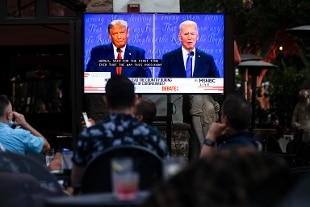Last duel Trump and Biden before the vote.
In the themes two opposing views of America
Joe Biden's political program
Share
October 24, 2020 Donald Trump rides two half missteps by Joe Biden in Thursday's TV duel: the first when he called Obama's policies on migrants on the Mexican border (including the construction of the cages) a mistake and the second when he evoked the exit from fossil energy.
"Joe Biden was very disrespectful to President Obama at last night's debate when he said he was 'the vice president, not the president' as he tried to justify himself for their failed migration policies. I wonder what" O "was thinking. (Obama, ed) when he heard this, "he tweeted.
In another twitter, however, he reports that Biden said he will go towards "the exit (from
fracking
) by 2025: I hope Texas, Pennsylvania, Ohio, Oklahoma, North Dakota and everyone else was listening last night.
High energy prices, massive job losses ", he warned, citing states (some of them in the balance) where the
fracking
industry is strong
, a polluting technique for extracting gas from underground rocks.
Biden said he is going to “transition out of (fracking) by 2025”.
I hope Texas, Pennsylvania, Ohio, Oklahoma, North Dakota, and all of the rest were listening last night.
High energy prices, massive jobs losses!
Vote Trump.
- Donald J. Trump (@realDonaldTrump) October 23, 2020
Biden had given a somewhat confused answer, saying he wanted to get out of the "oil industry", before clarifying that he intends to eliminate federal subsidies for the sector.
A move that would still have effects on
fracking
.
In his program, the candidate dem proposes a ban on new permits for the extraction of gas and oil on federal land but not a total ban on
fracking
.
Yesterday his deputy Kamala Harris had to run for cover: "Let's be clear, Biden will not ban
fracking
, he will put his hand to subsidies for the oil industry."
Left-wing Democrats, what Trump calls radical socialists, are thrilled with the idea that the United States is ending its dependence on oil and gas as part of the fight against climate change.
But this policy could alienate working-class voters in politically crucial states like Pennsylvania, Ohio and Texas, where many of the industry's employees are based.

